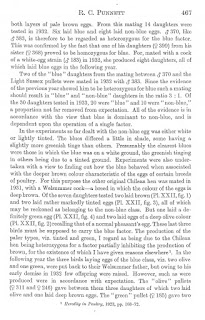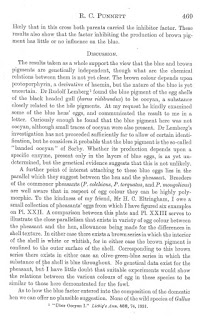Showing posts with label Research Reviews. Show all posts
Showing posts with label Research Reviews. Show all posts
Wednesday, January 1, 2014
Unraveling the Blues Old School
Our understanding of how this blue egg gene works is much farther along now but I still loved finding this in the archives of the archives this morning!
Reginald Punnett (1933). Genetic studies in poultry: IX. The blue egg
Journal of Genetics 27 (3) : 465 - 470
https://web.archive.org/web/20161020042409/www-old.ias.ac.in/jarch/jgenet/27/465.pdf
Saturday, July 20, 2013
Happiness Sunny Side Up
Earlier this summer a research review published by the University of Bristol called "The Intelligent Hen Study" summarized years of experiments that quantify what flock owners know, chickens are smart.
The long of the short is chicks can count higher higher, have better self-control, and superior spatial awareness than human toddlers . They also recognize symmetry...the free form builder in me wonders what they think of the coops I make....
My hamster-speed computer was not able to find the original research online but here's the most detailed article I came across. http://www.news.com.au/lifestyle/parenting/the-intelligent-hen8217-chickens-smarter-than-toddlers/story-fnet08ui-1226666106781
The research review was underwritten by international free-range egg producer Happy Egg Company to help guide facility development.
I'm very curious about what Happy Egg will do with the information and how their facilities will address flock enrichment. While this may seem odd, awkward, and impractical in the eyes of the battery cage industry, I'm sure follow up research will happen over the next few years. Sparky's Related Article on Friendships in Commercial Flocks
Happy Hens Company's Natural Hen Habitat (Out of detest for common industry practices I have resisted the urge to point out all the reasons why a nicely manicured park-like setting with a flock of genetically identical birds really doesn't look very natural. However, you should visit their website, it's actually quite interesting!)
----------------------------------------------------------------------------------------
And, BTW - In 2011 Vegetarians International Voice for Animals (VIVA!) called out Happy Egg Company, salaciously documenting something else flock owners already knew - chickens poop...and they die...and when they're little they need more supervision, and when they're older they need to leave the work force. I wasn't shocked by VIVA's findings; I was terrified by how little people know about the reality of the food they eat. Photoshop may be able to hide those bare spots scratched into the carefully mowed pasture by Happy birds looking for tasty treats, but all the digital manipulations in the world won't take away the fact that people actually expect those to be completely real.
The long of the short is chicks can count higher higher, have better self-control, and superior spatial awareness than human toddlers . They also recognize symmetry...the free form builder in me wonders what they think of the coops I make....
From The Guardian UK June 19, 2013 According to a new report, chickens appear to be much more intelligent than previously thought, with better numeracy and spatial awareness skills than young children. "The domesticated chicken is something of a phenomenon," Christine Nicol, professor of animal welfare at Bristol University, told the Times. "Studies over the past 20 years have revealed their finely honed sensory capacities, their ability to think, draw inferences, apply logic and plan ahead."
My hamster-speed computer was not able to find the original research online but here's the most detailed article I came across. http://www.news.com.au/lifestyle/parenting/the-intelligent-hen8217-chickens-smarter-than-toddlers/story-fnet08ui-1226666106781
The research review was underwritten by international free-range egg producer Happy Egg Company to help guide facility development.
Happy Hens Company's Natural Hen Habitat (Out of detest for common industry practices I have resisted the urge to point out all the reasons why a nicely manicured park-like setting with a flock of genetically identical birds really doesn't look very natural. However, you should visit their website, it's actually quite interesting!)
----------------------------------------------------------------------------------------
And, BTW - In 2011 Vegetarians International Voice for Animals (VIVA!) called out Happy Egg Company, salaciously documenting something else flock owners already knew - chickens poop...and they die...and when they're little they need more supervision, and when they're older they need to leave the work force. I wasn't shocked by VIVA's findings; I was terrified by how little people know about the reality of the food they eat. Photoshop may be able to hide those bare spots scratched into the carefully mowed pasture by Happy birds looking for tasty treats, but all the digital manipulations in the world won't take away the fact that people actually expect those to be completely real.
Sunday, March 31, 2013
Free Range Fractures
FROM WORLD POULTRY
March 2013
Skeletal health in laying hens is a major welfare and economic problem with up to 80% of hens suffering bone breakages in some free range systems. A new three-year study hopes to reduce the fracture rates in laying hens thanks to a grant of £532,000 funded by the Biotechnology and Biological Sciences Research Council (BBSRC) and supported by industrial partner, Noble Foods.With the 2012 EU ban on battery cage systems, as many as 30 million hens will be housed in alternative systems, mostly free range. This means a possible 24 million hens suffering bone breakage each year in the UK, which the industry and government view as unsustainable.
***************************************************************************

Sparky's editorial reaction: 80% of the free range hens have broken bones - from collisons with other birds?? What?? And this research is to figure out what to do to solve the problem?? I was very nearly compelled to pull up my user name for World Poultry (barndirtisaeuphemismforshit) and leave some snarky comment about how warped it is to need a study to prompt common sense. BUT, then I realized that this kind of study is absolutely necessary because the established poultry industry is amazingly removed from the reality of chickens. They're still trying to figure out an entirely new business model. So be it if it takes some absurd study to come to grips with what the rest of us already knew....free range is completely different from battery cages.
Thursday, January 31, 2013
Feathered Friends...or not
From World Poultry January 2013A Royal Veterinary College study has found that hens reared in commercial conditions do not form friendships and are not particular about who they spend time with. Full ArticleThe research published by Applied Animal Behaviour Science and funded by BBSRC, was carried out to discover if the welfare of chickens could be improved by taking advantage of 'friendships'. ************************************************************************************
Sparky's Reaction: Do they truly have no desire to form relationships? This is quite contrary to research done on birds in the past and goes against everything I've ever seen. If it's true and not a research flaw, what do we do with the knowledge that with selective breeding we are capable of eliminating social structure?
PS I'm sure I'm taking this way beyond the researchers intentions...at least I hope so but, isn't there something a little slimy in thinking about how to take advantage of friendships in terms of food production. Like, the birds with the most friends taste better? Is the next step to genetically isolate and replicate popularity. Eew.
 |
| Inseparable Cousins....yeah, really, cousins. |
Sparky's Reaction: Do they truly have no desire to form relationships? This is quite contrary to research done on birds in the past and goes against everything I've ever seen. If it's true and not a research flaw, what do we do with the knowledge that with selective breeding we are capable of eliminating social structure?
PS I'm sure I'm taking this way beyond the researchers intentions...at least I hope so but, isn't there something a little slimy in thinking about how to take advantage of friendships in terms of food production. Like, the birds with the most friends taste better? Is the next step to genetically isolate and replicate popularity. Eew.
Subscribe to:
Posts (Atom)








